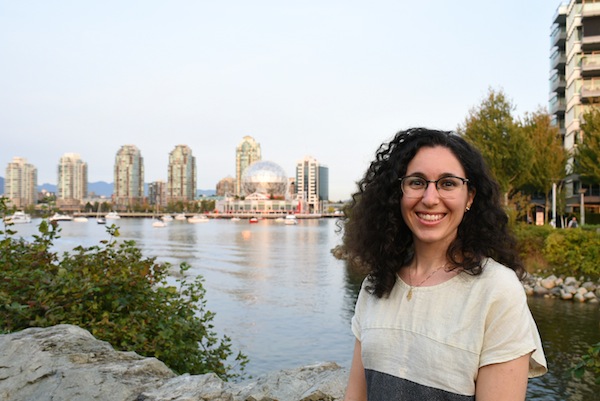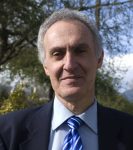Maayan Kreitzman (photo from Maayan Kreitzman)
Maayan Kreitzman said the Green party knew it was getting the “full package” when they tapped her as their candidate in the provincial election for the riding of Vancouver-False Creek. There are schisms in the environmental movement between those who see value in direct action protests and those who endorse electoral politics. Kreitzman backs both.
Kreitzman is a leading member of the Vancouver chapter of Extinction Rebellion, a global movement that practises civil disobedience to draw attention to the climate and ecological crisis, she said, based on “a theory of change that learns from many movements in the past that have basically put their bodies in the way of injustice.” She cited as models the U.S. civil rights movement, the Indian independence movement and the suffragists.
The group shut down the Burrard Street Bridge last year and is currently involved, with other groups, in a camp in Burnaby that is physically blocking the construction of the TMX pipeline.
But Kreitzman has harsh words for the environmental movement and its limited impacts.
“The environmental movement over the last 30 years has won some battles but we’re obviously losing the war because the climate and ecological catastrophe continues unabated essentially,” she said.
While she believes in blockades, she also believes in ballots.
“I definitely believe in both,” she said. “I think when the Green party chose me as a candidate they knew that they were getting the full package. They were getting somebody who believes in direct action, who believes in doing things that are illegal when they are ethical and the right thing to do. There are other people in the Green party that believe that, too. [Former federal Green leader] Elizabeth May got arrested on Burnaby Mountain in 2018. I’m certainly not alone in that.”
Beyond the shortcomings of the environmental movement, she excoriated the political system’s status quo.
“It’s utterly failing. It’s not fit for purpose. It has not delivered the systemic changes to our economy that we need to see in order to actually have a sustainable life and future on this planet,” she said.
Above a range of policy topics she champions, Kreitzman wants to create a citizens’ assembly on climate and ecological justice – this parliament of ordinary people selected to reflect demography “would devolve power from elected government to a more representative and radically democratic form of government.”
“Citizens’ assemblies go through a very rigorous and well-facilitated deliberative process where they have access to experts and all the best information and then they are empowered to make either decisions or recommendations, depending how their terms of reference are set up,” she explained. “The citizens’ assemblies are able to make way better, faster and more radical decisions on issues that are totally intractable for elected politicians because elected politicians operate on such short cycles and they have such perverse incentives. It’s very hard and we’ve seen how totally incapable elected politicians around the world are of making the kinds of decisions that we need in order to survive on this planet.”
Kreitzman has been thrown into politics mere days after completion of her PhD in resources, environment and sustainability at the University of British Columbia. Her research specialized in sustainable agricultural systems and, more specifically, perennial agriculture.
She was born in Vancouver to a Canadian father and an Israeli-Canadian mother, attended Vancouver Talmud Torah and Eric Hamber high school and was active in Hillel at UBC, as well as in the Graduate Students Society.
She wants to win the election – but winning isn’t everything.
“This race is not just about that,” she said. “It’s also about telling the truth and just giving a platform to a sustainability scientist, a youngish person and somebody who is willing to talk very openly about the failures of our current government systems. Not just our current government and the NDP, but our current government system and their lack of democracy, and the failures of the environmental movement itself, because neither have been effective and so far nothing has really been effective.”
While she is critical of government generally, she has harsh words for the NDP government particularly.
“This government’s record on the environment has been a total loss, it’s a complete failure,” Kreitzman said. “They’ve embraced the oil and gas industry even more than the BC Liberals have and I never thought I would say those words, that the NDP government has actually been worse for climate change and the environment than the BC Liberals have been. It’s shocking, but it’s true.”
She referenced a report from Stand.Earth, which outlines subsidies to fracking and indicates that the oil and gas industry receives four times as much in provincial government subsidies than it produces in royalties to the province.
As the candidate in Vancouver-False Creek, she is sounding the alarm that sea-level rise will make parts of the most densely populated neighbourhoods of Vancouver uninhabitable.
* * *
Kreitzman’s colleague Scott Bernstein is running for the Greens in Vancouver-Kingsway. He sees it as an ideal opportunity to contrast NDP policy with his ideas because he is facing off against Adrian Dix, the minister of health.
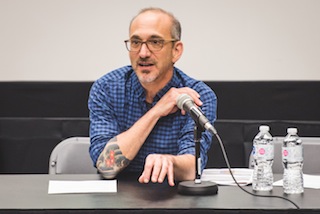
Bernstein is director of policy at the Canadian Drug Policy Coalition, which is based in the faculty of health sciences at Simon Fraser University. While he has a graduate degree in environmental studies, his career has shifted to drug policy. He was a junior co-counsel on the landmark 2011 Insite case at the Supreme Court of Canada, which found that the federal government’s failure to grant an exemption allowing users to consume illicit drugs at the Vancouver safe consumption site breached the Charter of Rights because it undermined the “maintenance and promotion of public health and safety.”
He also worked at Pivot Legal Society in the Downtown Eastside and operated a private practice for a time as well, before coming to the drug coalition about three-and-a-half years ago. He has worked for George Soros’ Open Society Foundations, in New York, focusing on drug policy at the UN level and in Africa, and he spent two years with the U.S. Peace Corps in Uzbekistan.
The record-breaking recent months of opioid deaths contrasts, Bernstein said, with the response to COVID.
“There are a lot of structural problems with how the government is dealing with the overdose crisis and it really was highlighted when we had another public health crisis and, all of a sudden, we saw how the government could sort of snap to attention, dedicate funding, have information flow, have protocols and guidelines and resources available to address COVID where, in reality, the overdose crisis is now in the fifth year since it was declared a public health emergency in B.C. and we’ve never seen the response that we saw with COVID, that materialized in a few weeks,” he said. He credited retiring Minister of Mental Health and Addictions Judy Darcy as “a wonderful and caring person,” but added: “they also didn’t give her sufficient resources to deal with the problem and she doesn’t have a lot of power in the cabinet.”
* * *
Ian Goldman, the Green candidate in Vancouver-Fairview, grew up in Toronto and moved west in 1988 to attend law school at UBC. He later did a master’s in international relations, also at UBC, and has practised immigration law in private practice since 1998.
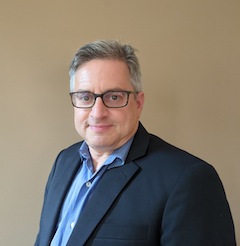
The first-time candidate is up against George Heyman, the NDP minister of environment and climate change strategy.
“It’s unfortunate that, in my area, the NDP have really strong support in the sense that he’s not really feeling pressure, I don’t think,” Goldman said. “Hopefully, I can make him feel some pressure. That’s the most important thing for me.”
The New Democrats have taken climate change more seriously than previous Liberal governments, he said, “But I think they’re more of a status quo party. They say they’re taking it seriously but then their actions show them out to be more status quo, no serious climate action, really.”
COVID is a serious issue, he said, but it has allowed governments at all levels to push environmental issues and climate change to the back burner, he argued.
“As soon as the pandemic’s over, people will wake up and say, oh my God, we’ve got a really serious issue here again,” said Goldman. “That’s why I joined the Green party. I’ve always been interested in environmental issues. My kids and I and my wife go for a lot of outdoor trips, we go hiking, a lot of outdoor activities we do together. That’s where my interest in the environment comes from.”
He added: “If people are really serious about tackling this issue, they should at least consider the Green party.”
* * *
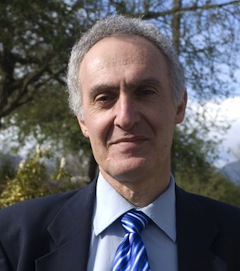
Michael Barkusky, an economist and certified public accountant, is in a rematch with Andrew Wilkinson, now the leader of the Liberal party, in the riding of Vancouver-Quilchena. He acknowledged it’s an uphill battle in the Liberal stronghold.
“What I’m trying to do is strengthen the Green party in general,” he said. But it is also an opportunity to press the party leader on environmental issues.
“I think the BC Liberals need to improve their green credentials substantially to be relevant in the long term,” said Barkusky, who came to Canada from South Africa in 1980. (More about his background and career is in our story from the last election, at jewishindependent.ca/apartheid-impacted-views.) He said former premier Gordon Campbell was innovative on a range of policies, including the carbon tax. He said Campbell’s successor, Christy Clark, backtracked on Campbell’s environmental policies.
The Liberal party is, Barkusky said, a “broad church with some very conservative elements and [Wilkinson] probably can’t do a lot of things that he would do if he had a completely free hand. I think the pressure needs to be kept up on them as much as it has to be kept up on the NDP.”
As he campaigns, Barkusky said, voters tell him they think the NDP ran a good government in part because of the Green party’s influence.
“And now they [the NDP] are trying to say they’ll do a better job without us,” he said. “I can’t buy that.… Quite a lot of voters in the riding agree with me. They feel that we had good government in the last three years and they credit the Green party with being an element of it being good.”
While he disagrees with the Liberals’ promise to eliminate the provincial sales tax for a year, he said changing it could be justifiable. Reducing it from seven percent on most items, or changing the number of items it covers, is a discussion worth considering, he said. But he sees the promise as akin to the NDP’s promise in the last election to eliminate tolls on bridges.
“It’s just kind of instant popularity,” he said. “A relatively bad policy that will resonate well with a certain constituency.”
Barkusky finds it interesting that there are four Green candidates in Vancouver who are Jewish, and noted that the federal Green party just elected a Jewish woman to lead it.
“That’s a lot of tikkun olam consciousness,” he said.
***
Note: This article has been amended to reflect that Maayan Kreitzman is a leading member of the Vancouver chapter of Extinction Rebellion, not of the British Columbia chapter, as originally stated.

